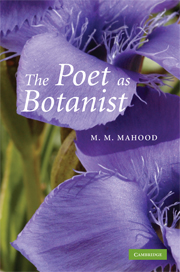Book contents
- Frontmatter
- Contents
- List of illustrations
- Acknowledgements
- A note on quotations
- Introduction
- 1 Primroses at Dove Cottage and Down House
- 2 Erasmus Darwin's feeling for the organism
- 3 Crabbe's slimy mallows and suffocated clover
- 4 John Clare: bard of the wild flowers
- 5 Ruskin's flowers of evil
- 6 D. H. Lawrence, botanist
- 7 Poetry and photosynthesis
- Index of persons
- Index of plants
5 - Ruskin's flowers of evil
Published online by Cambridge University Press: 22 September 2009
- Frontmatter
- Contents
- List of illustrations
- Acknowledgements
- A note on quotations
- Introduction
- 1 Primroses at Dove Cottage and Down House
- 2 Erasmus Darwin's feeling for the organism
- 3 Crabbe's slimy mallows and suffocated clover
- 4 John Clare: bard of the wild flowers
- 5 Ruskin's flowers of evil
- 6 D. H. Lawrence, botanist
- 7 Poetry and photosynthesis
- Index of persons
- Index of plants
Summary
17 June 1844 started badly for John Ruskin. ‘Set off about eight, to show my father and mother the fall of the eau de Bérard, but they were neither of them well, lost their tempers and spoiled all.’ His diary entry does not however begin with this family spat, but with ‘Today high up above the val d'Entragues, Cout[t]et pointed out to me a flower of the Soldanella which had actually pierced the snow, and was budding in the midst of it.’ For later the same day, Ruskin had been able to escape to clearer air. The Swiss guide showed concern for his safety on the snow-covered slopes, but whereas the protectiveness of his parents was irksome, that of Joseph Couttet, henceforth often to serve as a surrogate father (pro-papa is Ruskin's term), was fortifying. Moreover, he knew all about alpine plants. Two weeks previously, he had identified a small purple flower that still reposes in Ruskin's album of dried flowers, and told him that it was the first species to pierce the snow in spring. Now, above the Val d'Entragues, it was doing just that, breaking free in a thrust of self-affirmation that aroused in Ruskin a deeply empathic response.
Soldanella, the alpine snowbell, reappeared at another time of family tension four years later. Ruskin and his bride of two months had joined his parents for an intended tour of English cathedrals.
- Type
- Chapter
- Information
- The Poet as Botanist , pp. 147 - 182Publisher: Cambridge University PressPrint publication year: 2008

